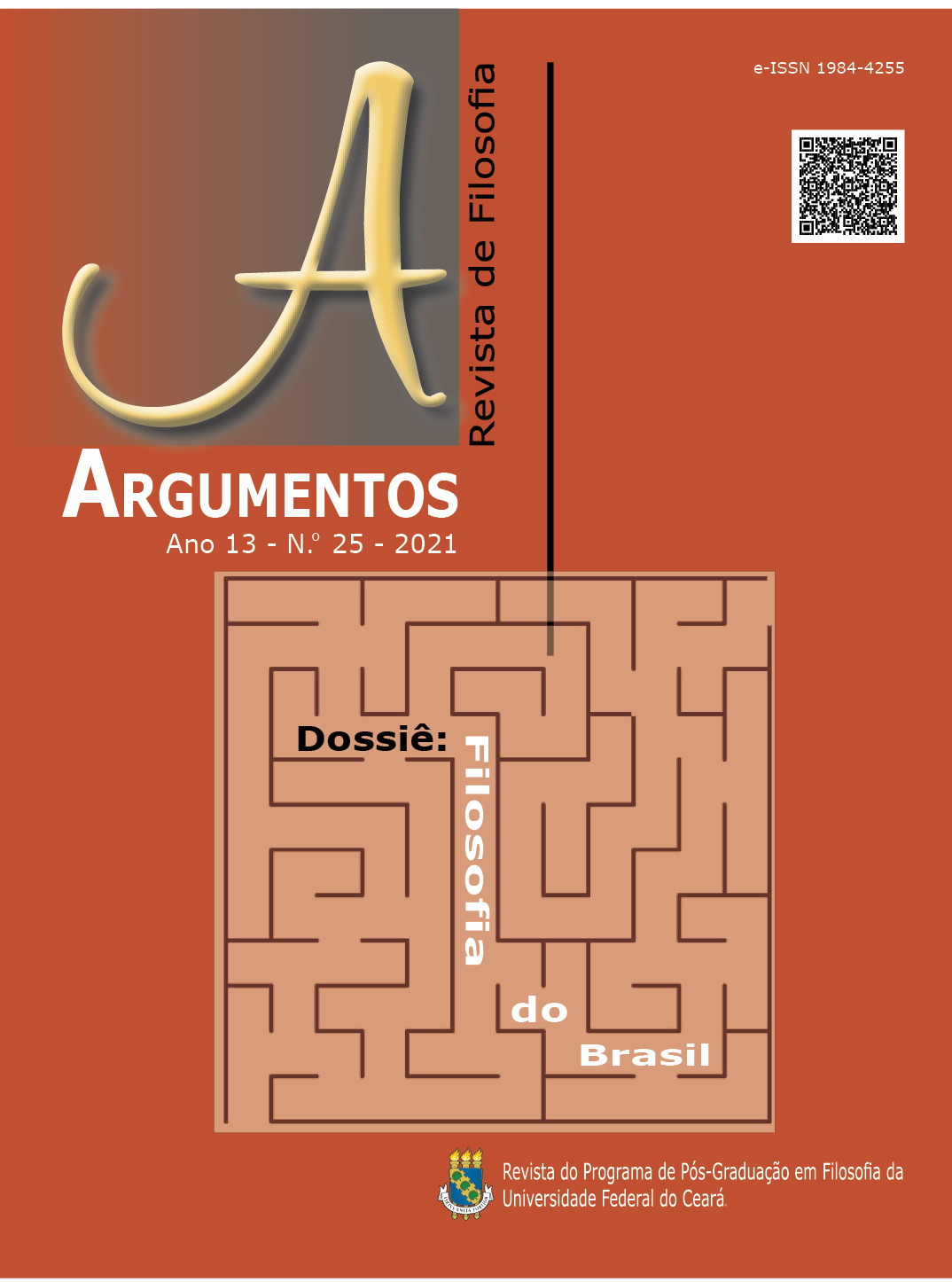Body/corporeality and science/technology: meetings and/or mismatches?
DOI:
https://doi.org/10.36517/Argumentos.25.22Keywords:
Body. Corporeality. Science. Technology.Abstract
The present writing, characterized as reflective, seeks to analyze the ideas that can be recognized in a logic of approximations and or contradictions between the constituent elements of the themes body/corporeality and science/technology in a pandemic moment that is plaguing society. Therefore, arguments will be opposed, in an axiological perspective, of elements present in the creation and operationalization of technology and of perceiving and experiencing corporeality. The arguments emphasize that to properly associate the two themes, it is necessary to resize the perception of the body. It is hoped, with this form of logical and sensitive reasoning, to contribute to the analysis of the relationships of human beings in the walk towards the possibility of (re)emergence of the importance of the human in man.
References
ALMEIDA, Vanessa Sievers de. Educação em Hannah Arendt: entre o mundo deserto e o amor ao mundo. São Paulo: Cortez, 2011.
CAPALBO, Creusa. Corpo e existência na filosofia de Maurice Merleau-Ponty. In: CASTRO, Dagmar S. P. de; PICCINO, Josefina D.; JOSGRILBERG, Rui de S.; GOTO, Tommy A. (org.). Corpo e existência. São Bernardo do Campo: UMESP-FENPEC, 2003. p. 11-23.
CAPRA, Fritjof. As conexões ocultas: ciência para uma vida sustentável. São Paulo: Cultrix, 2009.
CAPRA, Fritjof. O ponto de mutação: a ciência, a sociedade e a cultura emergente. São Paulo: Cultrix, 1997.
DE MASI, Domenico. A sociedade pós-industrial. In: DE MASI, Domenico (org.). A sociedade pós-industrial. São Paulo: Editora SENAC, 2000. p. 11-97.
GOMES, Rui Machado. Habeas corpus. In: RODRIGUES, David (org.). Os valores e as atividades corporais. São Paulo: Summus, 2008. p. 147-178.
HARARI, Yuval Noah. Homo Deus: uma breve história do amanhã. São Paulo: Companhia das Letras, 2016.
LE BRETON, David. Adeus ao corpo: antropologia e sociedade. Campinas: Papirus, 2003.
MERLEAU-PONTY, Maurice. Fenomenologia da percepção. Tradução Carlos Alberto Ribeiro de Moura. 5. ed. São Paulo: WMF Martins Fontes, 2018. (Biblioteca do pensamento moderno).
MERLEAU-PONTY, Maurice. O olho e o espírito. São Paulo: Cosac & Naify, 2004.
MOREIRA, Wagner Wey. Croniquetas: um retrato 3 x 4. [Piracicaba]: Gráfica Unimep, [2003].
MOREIRA, Wagner Wey; PORTO, Eline Tereza Rozante; MANESCHY, Pedro Paulo Araújo; SIMÕES, Regina. Corporeidade aprendente: a complexidade do aprender viver. In: MOREIRA, Wagner Wey (org.). Século XXI: a era do corpo ativo. Campinas: Papirus, 2006. p. 137-154.
MORIN, Edgar. Os sete saberes necessários à educação do futuro. 11. ed. São Paulo: Cortez; Brasília, DF: UNESCO, 2006.
MORIN, Edgar. A via para o futuro da humanidade. Rio de Janeiro: Bertrand Brasil, 2013.
NÓBREGA, Terezinha Petrucia. A atitude fenomenológica: o corpo-sujeito. In: NÓBREGA, Terezinha Petrucia; CAMINHA, Iraquitan de Oliveira (org.). Merleau-Ponty e a educação física. São Paulo: LiberArs, 2019. p. 69-91.
NÓBREGA, Terezinha Petrucia. Corporeidade: inspirações merleau-pontianas. Natal: Ed. do IFRN, 2016.
NOVAES, Adauto. A ciência no corpo. In: NOVAES, Adauto (org.). O homem-máquina: a ciência manipula o corpo. São Paulo: Companhia das Letras, 2003. p. 7-14.
PRIGOGINE, Ilya. Ciência, razão e paixão. Belém: Eduepa, 2001.
ROUANET, Sergio Paulo. O homem-máquina hoje. In: NOVAES, Adauto (org.). O homem-máquina: a ciência manipula o corpo. São Paulo: Companhia das Letras, 2003. p. 37-64.
SANTIN, Silvino. O corpo e a ética. In: DANTAS, Estélio H. M. (org.). Pensando o corpo e o movimento. 2. ed. Rio de Janeiro: Shape, 2005. p. 219-241.
Downloads
Published
Issue
Section
License
Argumentos magazine is licensed under an International Creative Commons Attribution License.
The Magazine uses CC BY inclusion
1) The authors retain the copyright granted to the magazine or the right to initial publication, with the work regularly licensed under the Creative Commons Attribution, which allows the sharing of the work with acknowledgment of authorship and initial publication in this magazine.
2) The authors are authorized to contract additional applicable contracts, for non-exclusive distribution of the version of the work published in this journal (for example, publication in the institutional repository or as a chapter of the book), recognition of authorship and initial publication in this journal.
3) Authors are authorized and encourage to publish and distribute their work online (for example, in institutional repositories or on their personal pages) at any time before or during the editorial process, as they can generate productive changes, as well as increase the impact and reference of published work.




.jpg)










._._3.png)
1.jpg)
._._._.png)
